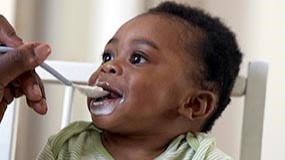At a glance
As your baby learns to chew and swallow foods, they may choke. Choking hazards can exist even after your child is feeding themselves and eating most foods.

Choking prevention
The way food is prepared may increase the risk of choking. For example, some foods served uncooked, whole, or in certain shapes or sizes can be choking hazards. Cutting food into smaller pieces and mashing foods can help prevent choking.
Ways to help prevent your child from choking
Foods and preparation
- Cook and prepare food to the right shape, size, and texture for your child's development.
- Avoid small, sticky, or hard foods that are difficult to chew and swallow.
Meals and snacktime
- Have your child sit up while eating (no lying down, crawling, or walking).
- Have your child sit in a high chair or other safe place.
- Avoid letting your child eat in the car or stroller.
- Keep mealtimes calm.
- Avoid distractions, disruptions, and rushing when eating.
Always
- Pay close attention to what your child puts in their mouth.
- Watch your child at all times while they are eating.
Be ready
Potential choking hazards for young children
The United States Department of Agriculture (USDA) Special Supplemental Nutrition Program for Women, Infants, and Children (WIC) made a list of foods to avoid due to choking risks for children. This list may not include all foods that could cause choking. Print this USDA handout for helpful tips to prevent choking.
Fruits and vegetables to avoid
- Cooked or raw whole corn kernels.
- Uncut cherry or grape tomatoes.
- Pieces of hard raw vegetables or fruit, such as raw carrots or apples.
- Whole pieces of canned fruit.
- Uncut grapes, berries, cherries, or melon balls.
- Uncooked dried vegetables or fruit, such as raisins.
Proteins to avoid
- Whole or chopped nuts and seeds.
- Chunks or spoonful of nut and seed butters, such as peanut butter.
- Tough or large chunks of meat.
- Hot dogs, meat sticks, or sausages.
- Large chunks of cheese, especially string cheese.
- Bones in meat or fish.
- Whole beans.
Grain products to avoid
- Cookies or granola bars.
- Potato or corn chips, pretzels, popcorn, or similar snack foods.
- Crackers or breads with seeds, nut pieces, or whole grain kernels.
- Whole grain kernels of cooked barley, wheat, or other grains.
- Plain wheat germ.
Sweetened foods to avoid
- Round or hard candy, jelly beans, caramels, gum drops, or gummy candies.
- Chewy fruit snacks.
- Chewing gum.
- Marshmallows.
